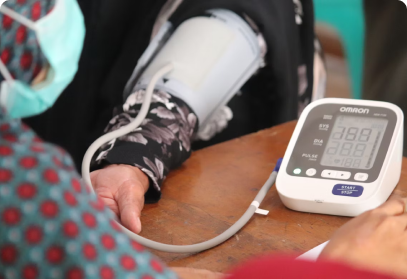Heart Health: What You Need to Know About Preventive Check-Ups

Your heart is the engine that powers your entire body. Maintaining cardiovascular health is essential for a long, active, and healthy life. Heart disease remains one of the leading causes of death worldwide, but many cases can be prevented or managed effectively through early detection and lifestyle modifications. At City Care Clinic, we offer comprehensive heart check-ups, preventive guidance, and personalized care to help patients maintain optimal cardiovascular health.
Why Heart Health Matters?
The heart works continuously to pump blood, delivering oxygen and nutrients to every part of the body. Cardiovascular diseases (CVD), including heart attacks, strokes, and high blood pressure, can severely affect quality of life and lead to life-threatening complications.
Many heart-related conditions develop silently, often without noticeable symptoms until they become serious. Preventive heart check-ups allow early detection of risk factors and enable timely intervention to prevent long-term damage.
Common Heart Health Issues:
1. Hypertension (High Blood Pressure)
High blood pressure strains the heart and arteries, increasing the risk of heart attack, stroke, and kidney disease. Often called the “silent killer,” hypertension may not show obvious symptoms but requires regular monitoring.
Symptoms:
- Headaches
- Shortness of breath
- Dizziness
- Chest pain (in severe cases)
2. Coronary Artery Disease (CAD)
CAD occurs when the arteries supplying blood to the heart become narrowed due to plaque buildup. This can lead to chest pain (angina), heart attacks, or heart failure if untreated.
3. Arrhythmias
Abnormal heart rhythms, such as atrial fibrillation, can disrupt normal blood flow and increase the risk of stroke and other complications.
4. Heart Failure
Heart failure occurs when the heart cannot pump blood efficiently, leading to fatigue, fluid retention, and reduced physical ability.
Risk Factors for Heart Disease:
Identifying and managing risk factors is key to preventing heart problems:
- Age: Risk increases with age
- Family History: Genetics play a significant role
- Lifestyle Factors: Poor diet, lack of exercise, smoking, and alcohol use
- Medical Conditions: Diabetes, high cholesterol, and obesity
- Stress: Chronic stress and anxiety affect heart health
Understanding your individual risk profile allows healthcare providers to create a targeted preventive plan.
Preventive Measures for a Healthy Heart:
1. Regular Check-Ups
Routine heart evaluations help detect early warning signs before serious problems arise. At City Care Clinic, preventive check-ups include:
- Blood pressure measurement
- Cholesterol and blood sugar testing
- ECG and heart rhythm assessments
- Risk factor evaluation and lifestyle counseling
2. Healthy Diet
A heart-healthy diet is low in saturated fats, trans fats, and added sugars while rich in:
- Fruits and vegetables
- Whole grains
- Lean protein sources such as fish, poultry, and legumes
- Healthy fats like olive oil and nuts
3. Regular Physical Activity
Exercise strengthens the heart, improves circulation, lowers blood pressure, and supports healthy cholesterol levels. Aim for at least 30 minutes of moderate-intensity exercise, five days a week.
4. Stress Management
Chronic stress can elevate blood pressure and heart rate, increasing cardiovascular risk. Practices such as meditation, yoga, deep breathing, and hobbies can reduce stress levels.
5. Avoid Smoking and Limit Alcohol
Smoking damages blood vessels and accelerates plaque buildup, while excessive alcohol intake can raise blood pressure and contribute to heart disease.
Symptoms That Require Immediate Attention:
While preventive care is essential, it’s also important to recognize signs of potential heart issues:
- Chest pain or discomfort
- Shortness of breath
- Irregular heartbeat or palpitations
- Unexplained fatigue
- Swelling in legs, ankles, or feet
If any of these symptoms occur, immediate medical attention is critical to prevent serious complications.
Diagnostic Tools for Heart Health:
City Care Clinic uses advanced diagnostic tools to assess heart health accurately:
- Electrocardiogram (ECG): Measures electrical activity of the heart to detect arrhythmias.
- Echocardiogram: Ultrasound imaging to assess heart structure and function.
- Stress Testing: Evaluates how the heart performs under physical exertion.
- Blood Tests: Measure cholesterol, triglycerides, blood sugar, and other cardiac markers.
- Blood Pressure Monitoring: Regular checks to detect hypertension early.
How City Care Clinic Supports Heart Health?
City Care Clinic provides a comprehensive, patient-focused approach to cardiovascular care:
- Personalized Assessments: Evaluate individual risk factors and overall heart health.
- Preventive Care Plans: Diet, exercise, and lifestyle recommendations tailored to each patient.
- Early Detection and Intervention: Regular screenings identify issues before they escalate.
- Experienced Cardiology Team: Specialized care from professionals trained in cardiovascular health.
- Education and Guidance: Teaching patients how to maintain heart health for life.
Conclusion:
Heart health is the foundation of overall well-being. Preventive check-ups, a healthy lifestyle, and awareness of risk factors are essential to maintaining a strong, functioning heart. At City Care Clinic, our comprehensive heart health services combine expert assessment, personalized care, and advanced diagnostic tools to help patients live healthier, longer lives.
Take the first step toward a healthier heart today. Schedule a preventive heart check-up at City Care Clinic and safeguard your cardiovascular health for years to come.







.png)
.png)
.png)
.png)

.png)